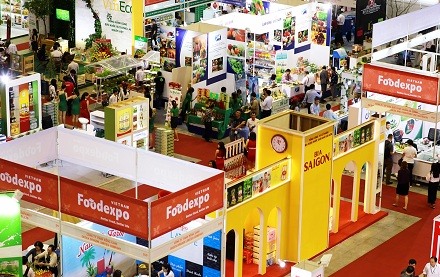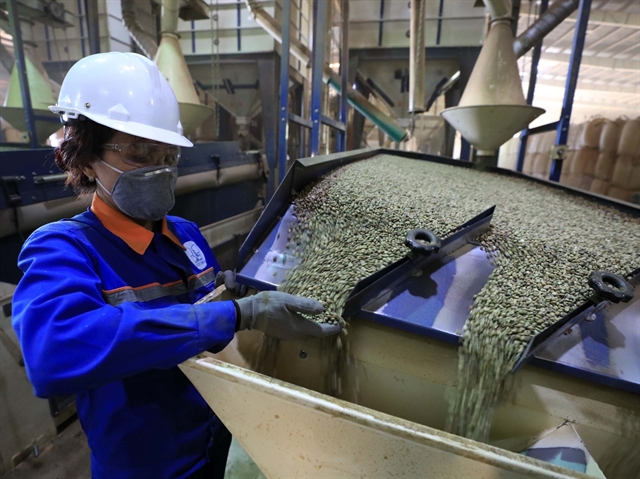 Economy
Economy

A trade co-operation programme between HCM City and other cities and provinces over the last five years has significantly improved product quality, met consumer demand and promoted socio-economic development, city officials have said.
 |
| A trade co-operation programme between HCM City and other cities and provinces over the last five years has significantly improved product quality, met consumer demand and promoted socio-economic development. — Photo thuongmai.vn |
HCM CITY — A trade co-operation programme between HCM City and other cities and provinces over the last five years has significantly improved product quality, met consumer demand and promoted socio-economic development, city officials have said.
Begun in 2011, the programme focuses on providing information on authorities’ oversight of commerce, supports firms in creating links in production and distribution, strengthens oversight to ensure product quality, and improves human resources training.
Speaking at a conference in HCM City yesterday, Nguyễn Quỳnh Trang, deputy director of the Department of Industry and Trade, said the programme had helped HCM City distributors and retailers find suppliers of quality products, including regional speciality products.
It has also helped manufacturers find steady outlets for their products and feel secure about investing more in expansion and improving product quality.
More businesses have signed up for the programme, with 1,349 contracts worth more than VNĐ22.13 trillion (US$977.1 million) signed as of last month, she said.
HCM City firms had bought goods worth VNĐ15.49 trillion ($684.2 million) and sold VNĐ6.63 trillion of goods..
The event this year for the first time attracted the participation of businesses from the northern provinces of Hà Giang and Hòa Bình.
Vũ Thị Thu Hà, deputy director of Kim Bôi Agro-Forestry Joint Stock Company in Hòa Bình Province, said many specialities of the northwest region like nấm hương (thin top-mushroom), nấm mèo (wood-ear mushroom) and táo mèo (an apple-like fruit) were sold only in supermarkets and restaurants in the north.
“I hope that via this event, we can distribute these products in HCM City,” she said. “Consumers in HCM City as well as in southern provinces should feel secure when using our products, which meet hygiene and food safety standards.”
Nguyễn Thị Thu Thủy, deputy general director of Saigon Co.op, said her company regularly participated in matching supply/demand events in an aim to find quality and regional special products for its retail chain.
Lê Thanh Liêm, deputy chairman of the HCM City People’s Committee, said the city had huge demand for many kinds of products like fruits and vegetables, pork and seafood, but could only meet 20-30 per cent of demand.
The city has signed co-operation agreements with many provinces, including Lâm Đồng, Đồng Nai, Tiền Giang, Long An, Kiên Giang and Bà Rịa-Vũng Tàu to ensure supply of goods to the city market, especially during Tết (Lunar New Year) when demand jumps by 20-30 per cent, he said.
Deputy Minister of Industry and Trade Hồ Thị Kim Thoa urged HCM City to expand the co-operation model to other places, and said she hoped more businesses would join the programme to increase the supply of quality goods.
Despite achievements, the programme has some shortcomings, including 187 principal contracts that either have not been implemented or have been carried out ineffectively.
Trang of the Department of Industry and Trade said the weaknesses were caused by various factors, including not meeting retailers’ demand and failing to negotiate discount rates and payment methods.
Phạm Thành Kiên, director of the HCM City Department of Industry and Trade, said the department would continue to co-operate with its counterparts in other cities and provinces to exchange information about supply/demand connection programmes, and support firms in creating links in production and distribution, as well as strengthen inspections to secure product quality.
He urged businesses to focus more on developing their material zones to ensure consumer access through more supply and expand.distribution networks.
At the event, 369 contracts were signed between distributors, export companies and eateries in the city, as well as specialty manufacturing establishments and agricultural co-operatives, among others.
Nearly 1,000 producers, distributors, wholesale markets, restaurants, hotels, banks and eateries from 38 provinces and cities took part in the two-day event, which included an exhibition featuring more than 350 booths displaying products of different regions in the country. — VNS


.jpg)

